There are many, many reasons why everyone seems to holiday in Puglia.
This honey-colored city, a bastion of Mediterranean art and culture, is one of them.
The Florence of the South is a real gem, but don't call it an open-air museum: local people know that there is much more to the beauty of its churches and galleries.
Here is our selection of the best things to do in Lecce like a local.
The best things to do in Lecce like a local
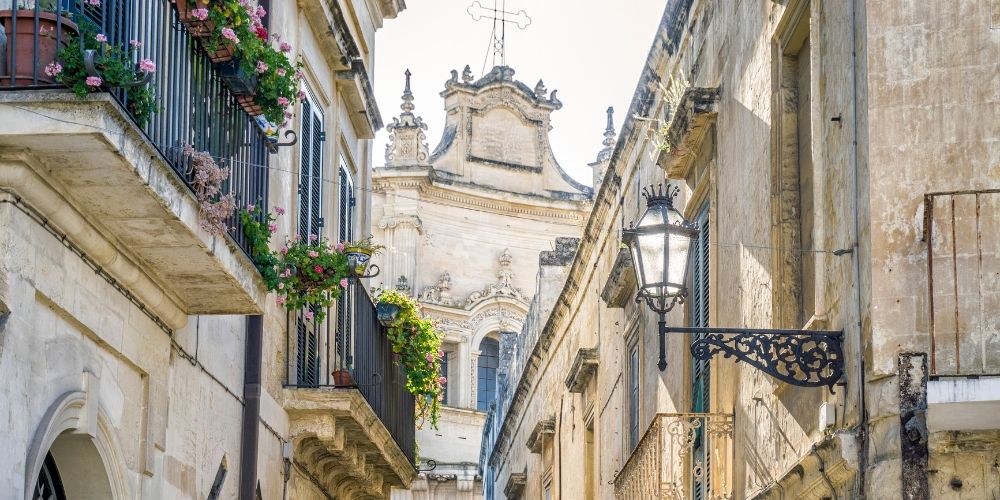
It is difficult to find other places with a more harmonious urban landscape.
With its irresistible mix of Baroque and exquisitely Mediterranian landscapes, it is a perfect destination all year round, winter and summer alike.
You only have to travel a short distance to reach storybook villages, beaches so white to dazzle, and ancient and mysterious traditions that seem to trace a piece of Greece in Puglia.
The exploration is a treat for the eyes, palate, and spirit.
If you want to upgrade your trip, follow the Leccesi's habits. We've revealed some of them in our list of the best things to do in Lecce like a local.

Listen to our podcast Lecce Like a Local
10. Things to do in Lecce like a local. Breakfast with pasticciotto and caffe Leccese
Lecce is an elegant city with a strong sense of aesthetics. Everything fits together perfectly, from the warm colour of the clear pietra leccese to the curved architecture of the historic centre. Even food does not clash.
Take pasticciotto, a classic Pugliese delicacy consisting of an amber shortcrust pastry shell with a fragrant, mouth-watering custard inside. It is soft, sweet and enveloping like the shapes of Barocco Leccese. Don't leave without first tasting one (and devouring ten, a hundred, a thousand...).
The perfect day begins at a table outside a bar in central Lecce with the smell of hot, freshly-baked pasticciotti. The challenge is to hold out for the cream to cool long enough to avoid a third-degree burn to the palate.
In summer, do as the locals do and eat your special custard pie with a good coffee. Espresso? No, Leccese. Fresh and thirst-quenching, it involves the addition of almond milk and iced coffee.
Discover Pugliese food9. Visit a church without the façade
Rosettes, bizarre characters carved in stone, inlaid columns, friezes and any other kind of decoration you can think of. The lively fronts of Lecce's churches design the historic centre with an imaginative and sublime delicacy. All but one.
The Church of San Francesco della Scarpa stands out for a very unusual detail in a city like Lecce: it has no façade. This chiesa is discreetly incorporated in the porticoes of an edifice known as Collegio Palmieri.
It is said that St Francis stopped here while on his way to the Holy Land and left one of his sandals as a gift for the kind welcome.
The church, now deconsecrated, is a venue for exhibitions and conferences. The interior still preserves 17th-century frescoes and four of the ten original altars.
Another curiosity: Cosimo de Giorgi, the founder of Lecce's astronomical observatory, used the bell tower as a meteorological station in the 19th century.
Book tickets Abbey of Santa Maria di Cerrate in Lecce8. Staying in winter
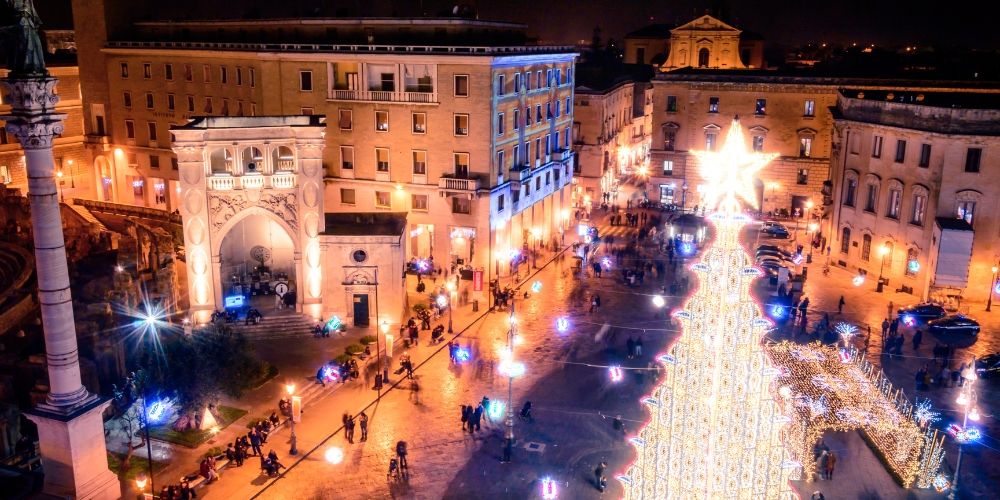
With its Caribbean-style beaches and crystal-clear waters, Puglia is a true summer dream. But as the coterie of Lecce enthusiasts is well aware, winter also reserves pleasant surprises.
Those who want to visit Lecce like a local should look beyond the Puglia-sea combination. For example, December is an ideal time to go and attend the Fiera di Santa Lucia, the fair that marks the opening of the Christmas season.
The city gets all glow and sparkles from the Christmas lights, and the unmistakable fragrances featuring every patronal festival at all latitudes waft through the air.
Its market is among the most visited in Puglia. Pugliese artisans are the stars of the celebration. You can get lost among tonnes of terracotta and papier-mâché figurines depicting nativity scenes.
Those travelling in January should make a detour to Novoli, about ten kilometres from Lecce, and attend the enormous bonfire of the Festa di Sant'Antonio, La Focara. The tradition is one of the most heartfelt events in Salento. Furthermore, the town of Novoli is in the Negramaro park, where the local namesake wine is produced: grab the chance to sip a glass.
Need a hint for a pleasant stay that is always valid regardless of the season? With so many options available, it's not always easy to choose. But here we are! We have selected a cosy and convenient accommodation for you.
Holidays Lecce is an elegant b&b a short distance from the city centre and nightlife. It's excellent for enjoying a relaxing holiday (also with your pet). The rooms are spacious and comfortable and offer everything you need even if you are travelling on business.
Book a tour in Puglia7. Peeking through courtyards
Some of Lecce's most romantic and evocative corners are secret places hidden inside the historic centre's unsuspected Baroque façades.
When the doors open, passers-by are surprised with unexpected vistas you wouldn't expect while wandering around.
May is the ideal month to discover these hidden gems. The occasion is Cortili Aperti (Open Courtyards), an event that allows visitors to see the city from a privileged point of view, just like a genuine resident. It's an excellent opportunity to visit Lecce like a local and discover spots generally off the tourist radar: private gardens, ancient oil mills, and Roman walls, all nestled in the heart of the town.
Among the most beautiful buildings to visit, take note of the Seminario in Piazza Duomo. It hosts the Museum of Sacred Art (Museo Diocesano di Arte Sacra). Still, the real surprise lies in the inner courtyard: a mesmerising, refined Baroque well, richly decorated and surmounted by a statue depicting St Irene.
Book Walking Tour in Puglia6. Looking for a window in the shape of...
...a penis. Or so it seems. The "impudent" grill is located at 22 Via Palmieri, just a few steps from Piazza Duomo. According to legend, it used to indicate the presence of a former brothel.
Nevertheless, this hypothesis seems to have no connection with reality, and more likely, the Liberty style decoration is nothing more than a classic ornamental element typical of the early 1900s art.
Predictably, the prurient version has taken hold among the curious and good-tempered. After all, ancient cities are crammed with anecdotes and details carrying suggestions and superstitions that are part of their appeal.
Another example is offered by the mosaic in Piazza Sant'Oronzo. Among the city's most photographed curiosities, it depicts Lecce's coat of arms, a she-wolf at the foot of a holm oak tree. What's so unusual about it? It is said to bring bad luck to university students. Just superstition?
5. Planning a day trip
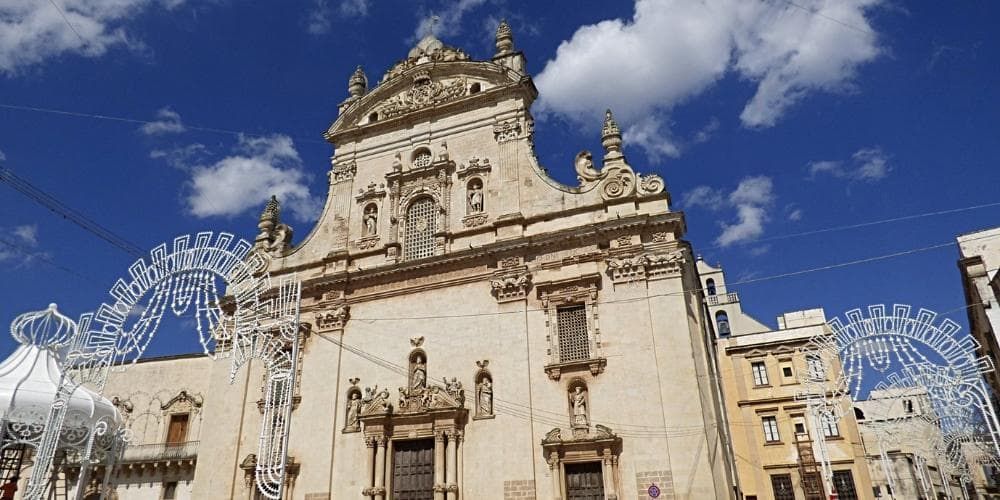
There are a lot of things to see around Lecce. Sort out a plan of action for a day trip full of fun and beauty. With seductive beaches and coastal villages to reach in less than an hour's drive you are spoilt for choice.
The Baroque towns of Galatina, Maglie and Specchia are just a few kilometres away and guarantee a feast of art in an informal and relaxed setting.
The seaside town of Santa Caterina has rocky shores, crystal-clear waters, caves to dive into and ideal wind for kite surfing.
As for the beaches, Torre Chianca is among the most frequented by the locals. You can swim at the sight of a 16th-century tower, and the shallow waters make it ideal for children.
At sunset, you can visit one of the many vineyards in the area, taste typical products and sip the famous local wine.
Book Boat Tour in Puglia4. Dining in a masseria
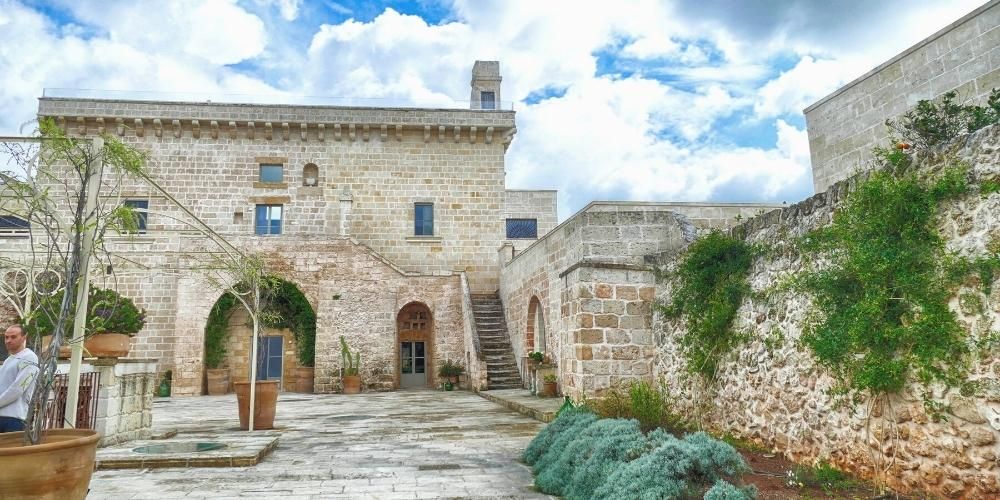
It's an evergreen: eating in a masseria is a must-do when in Puglia. The atmosphere is similar to the typical Andalusian haciendas.
Once farm complexes spread across southern Italy, many masserias are now B&Bs and hotels de charme, where you can dine under a romantic pergola surrounded by olive trees and the scents of the Pugliese countryside.
It's easy to come across such particular historical architectures when driving around the region. Beyond their whitewashed walls, large inner courtyards open onto old lodgings for farmers and landowners, stables, wells, cisterns, warehouses and tool sheds.
With a bit of imagination, you will be able to project yourself into the rural past of these fascinating places amid an ambience of genuineness and beauty.
3. Buying a papier-mâché souvenir
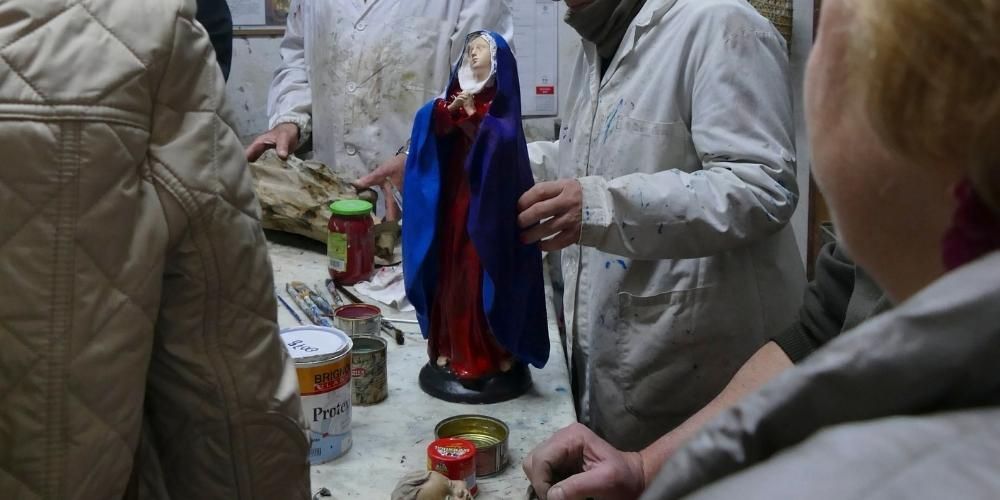
Not the classic souvenir. Strolling through the narrow streets around the Cathedral and down Corso Vittorio Emanuele II, you can't but notice peculiar shops with a revealing smell. A scent of yesteryear, of paper, glue and creativity, the same that has always distinguished Lecce's papier-mâché masters. Step in and browse.
Lecce and the cartapesta art share a strong bond, a story that began in the 17th century and grew hand-in-hand with the proliferation of churches and monuments.
The barbers were the first in town to try their hand at working with paper, straw and chalk. From the backrooms of their shops, papier-mâché artefacts invaded the interior of the new-build Baroque churches.
Such extraordinarily realistic works made from very poor raw materials often replaced statues of much more valuable and expensive matter.
To figure out what local artisans were capable of, enter the church of Santa Chiara and lift your gaze: you are not looking at a classic wooden ceiling but 300 square metres of papier-mâché surface.
2. Spending the evening in piazza
The ideal evening in Lecce is amid the cocktail bars and cafes of the old town. Piazza Sant'Oronzo, Piazza del Duomo, Piazzetta Santa Chiara and Porta San Biagio are among the most popular spots for nightlife.
The locals love to experience their city in the open air, and walking the length and breadth of the corso under the stars (a custom the Leccesi call "vasca") is almost a collective ritual.
Especially in summer, the centre's streets become crowded with chatter, music, dancing and laughter, with daily events spicing up the night.
Lecce pampers its people with a bubbly and casual atmosphere.
La movida starts at sunset with citizens and tourists gathering to inaugurate the evening with a good aperitif and continues until late in the magic of the Baroque at night.
Squares and alleyways are lined with wine bars, breweries, restaurants and pastry shops where you can end the day the way you started it: biting a hot pasticciotto.
1. Dancing with… tarantulas
Would you like to learn how to dance the overwhelming typical local rhythm? Then all you have to do is get bitten by a tarantula and see what happens.
Joking aside, the classic Pugliese taranta being linked to the bite of a spider is an ancient folk tradition. The frantic movements performed to the rhythm of therapeutic-meant music had a healing function and were believed to help eliminate any traces of venom.
Don't worry, there is no need to get close to a spider to learn how to dance like the locals. All you have to do is take an intensive pizzica lesson in Lecce. After a couple of hours, you'll master the basic moves to get by at dancing events in piazzas, which can be frequent and improvised in summer. It takes a group of street performers and a band playing live, and you'll be twirling in no time.
The most eagerly awaited show is the acclaimed Notte della Taranta in Melpignano (about a 20-minute drive from Lecce). Every August, the concert attracts Pugliesi and tourists united by the dragging popular music of Salento.
About the author
Written on 17/07/2024

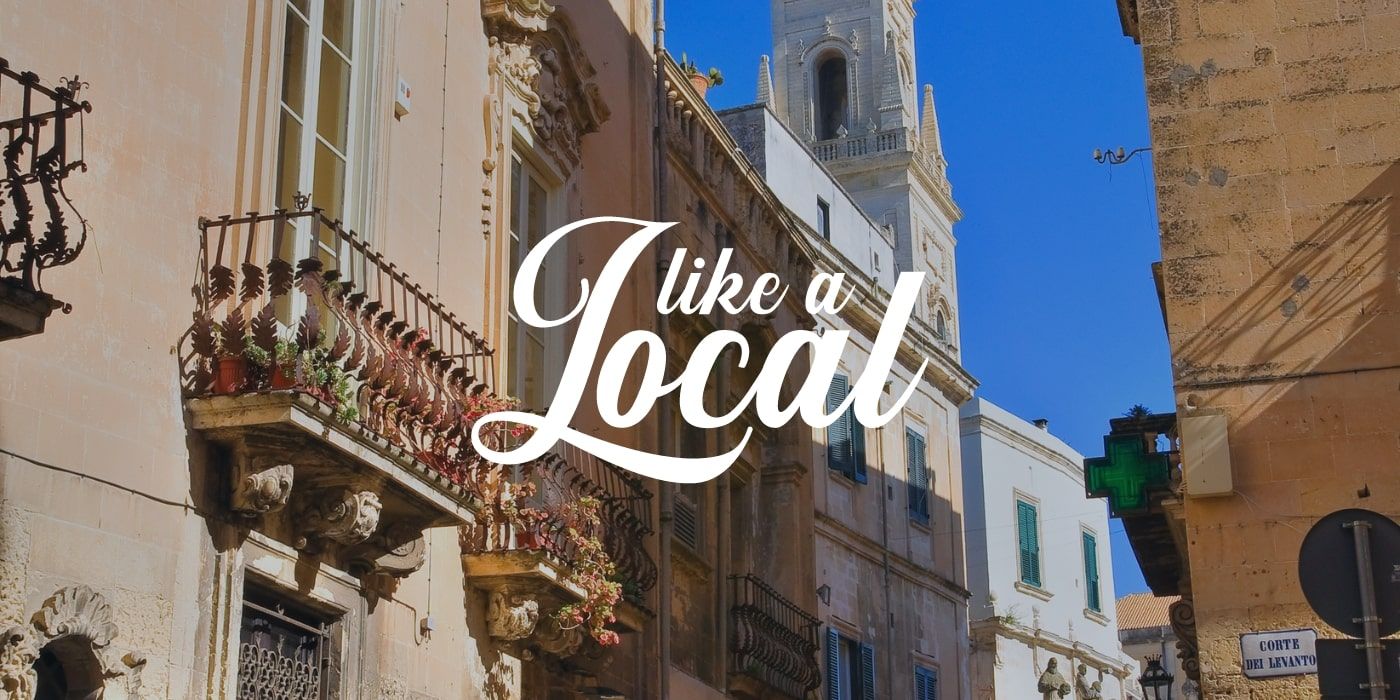

Lorena Calise
Have you already arranged your next holiday in Puglia? You should definitely visit Lecce. Like a local. Get inspired by our suggestions.